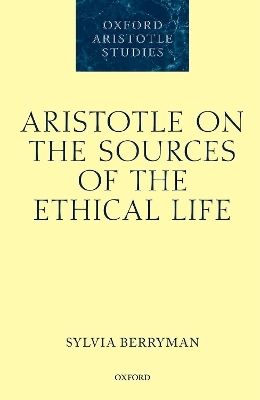
Aristotle on the Sources of the Ethical Life
Seiten
2019
Oxford University Press (Verlag)
978-0-19-883500-4 (ISBN)
Oxford University Press (Verlag)
978-0-19-883500-4 (ISBN)
Sylvia Berryman offers a fresh understanding of Aristotle's ethical theory, challenging the common belief that he aimed to give it a biological foundation in human nature. Berryman reinterprets Aristotle's views as a 'middle way' between the metaphysical grounding offered by Platonists and sceptical or subjectivist alternatives.
Aristotle on the Sources of the Ethical Life challenges the common belief that Aristotle's ethics is founded on an appeal to human nature, an appeal that is thought to be intended to provide both substantive ethical advice and justification for the demands of ethics. Sylvia Berryman argues that this is not Aristotle's intent, while resisting the view that Aristotle was blind to questions of the source or justification of his ethical views. She interprets Aristotle's views as a 'middle way' between the metaphysical grounding offered by Platonists, and the scepticism or subjectivist alternatives articulated by others. The commitments implicit in the nature of action figure prominently in this account: Aristotle reinterprets Socrates' famous paradox that no-one does evil willingly, taking it to mean that a commitment to pursuing the good is implicit in the very nature of action.
Aristotle on the Sources of the Ethical Life challenges the common belief that Aristotle's ethics is founded on an appeal to human nature, an appeal that is thought to be intended to provide both substantive ethical advice and justification for the demands of ethics. Sylvia Berryman argues that this is not Aristotle's intent, while resisting the view that Aristotle was blind to questions of the source or justification of his ethical views. She interprets Aristotle's views as a 'middle way' between the metaphysical grounding offered by Platonists, and the scepticism or subjectivist alternatives articulated by others. The commitments implicit in the nature of action figure prominently in this account: Aristotle reinterprets Socrates' famous paradox that no-one does evil willingly, taking it to mean that a commitment to pursuing the good is implicit in the very nature of action.
Sylvia Berryman is Associate Professor of Philosophy at the University of British Columbia. Her previous research into the history of ancient Greek ideas about the sciences and their impact on philosophy led to her current interest in the impact of Aristotle's biological work on his conception of the good in ethics. She is also interested in the applications of Aristotelian virtue ethics in contemporary philosophy.
1: Introduction
2: Aristotle in the Ethics Wars
3: Nature and the Sources of Normativity
4: Is Aristotle an Archimedean Naturalist?
5: Naturalism in Aristotle's Politics
6: The Case against a Naturalist Reading
7: Aristotle's Metaethics
8: Socratic Bootstrapping
Coda. Aristotle and the Practical Turn
Bibliography
Index Locurum
| Erscheinungsdatum | 17.05.2019 |
|---|---|
| Reihe/Serie | Oxford Aristotle Studies Series |
| Verlagsort | Oxford |
| Sprache | englisch |
| Maße | 163 x 238 mm |
| Gewicht | 482 g |
| Themenwelt | Literatur ► Klassiker / Moderne Klassiker |
| Geisteswissenschaften ► Philosophie ► Allgemeines / Lexika | |
| Geisteswissenschaften ► Philosophie ► Ethik | |
| Geisteswissenschaften ► Philosophie ► Philosophie Altertum / Antike | |
| ISBN-10 | 0-19-883500-0 / 0198835000 |
| ISBN-13 | 978-0-19-883500-4 / 9780198835004 |
| Zustand | Neuware |
| Haben Sie eine Frage zum Produkt? |
Mehr entdecken
aus dem Bereich
aus dem Bereich
die letzten Jahre der Philosophie und der Beginn einer neuen …
Buch | Hardcover (2024)
Klett-Cotta (Verlag)
28,00 €
Gesundheitsschutz, Selbstbestimmungsrechte, Rechtspolitik
Buch | Softcover (2024)
Kohlhammer (Verlag)
39,00 €
Jenseits von Identität | Ausgezeichnet mit dem Leipziger Buchpreis …
Buch | Softcover (2023)
Ullstein Taschenbuch Verlag
13,99 €


